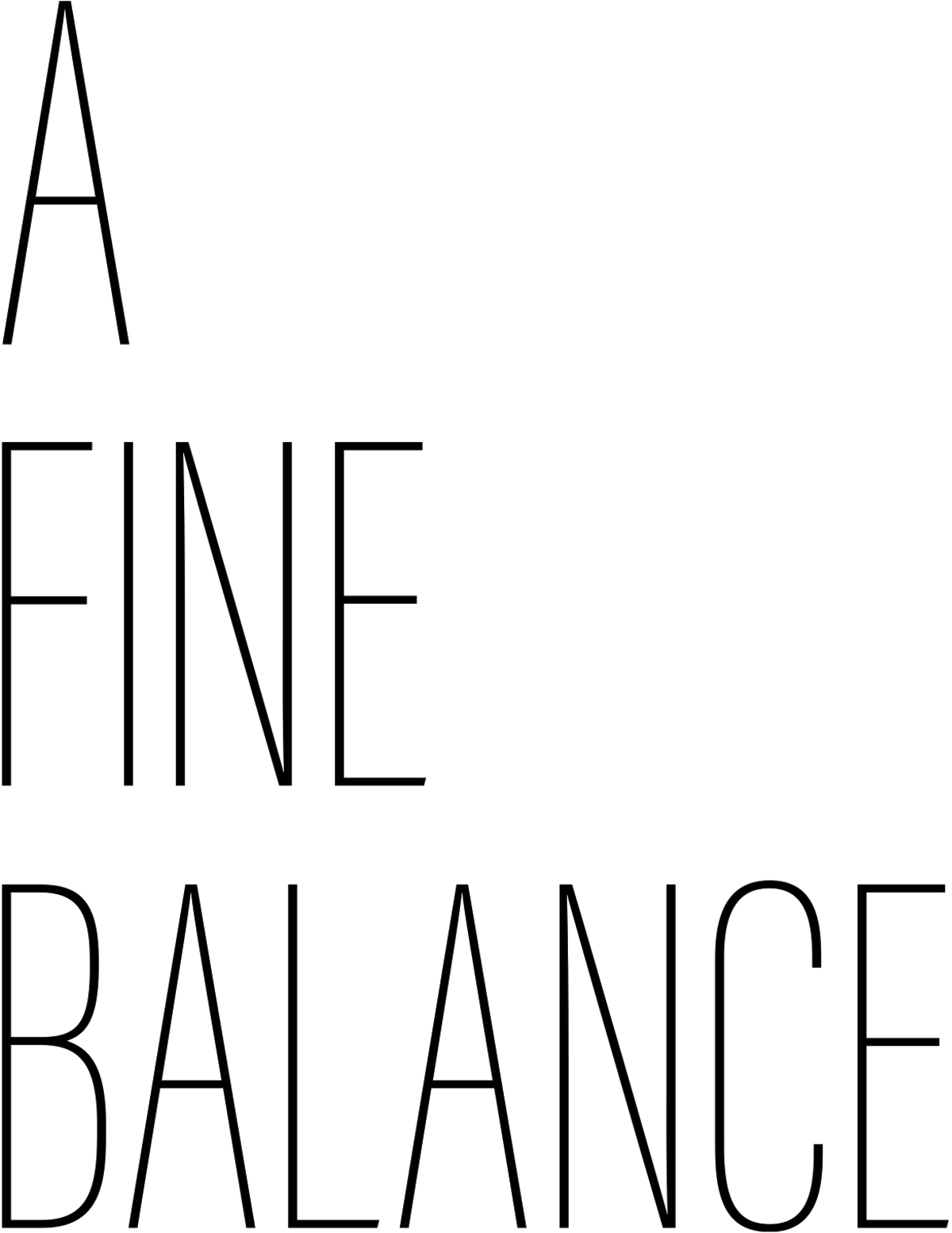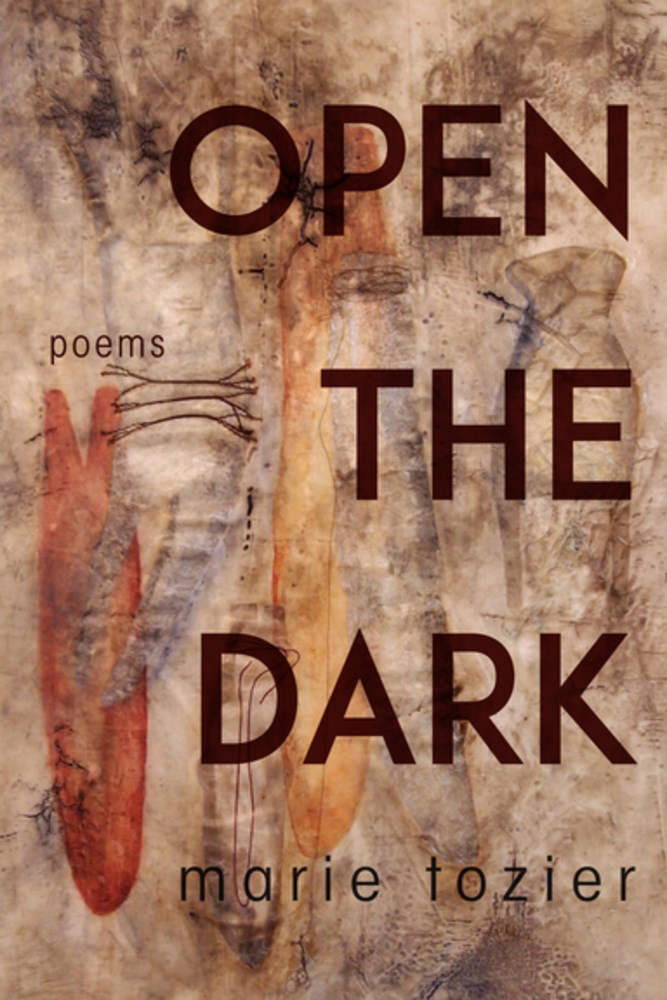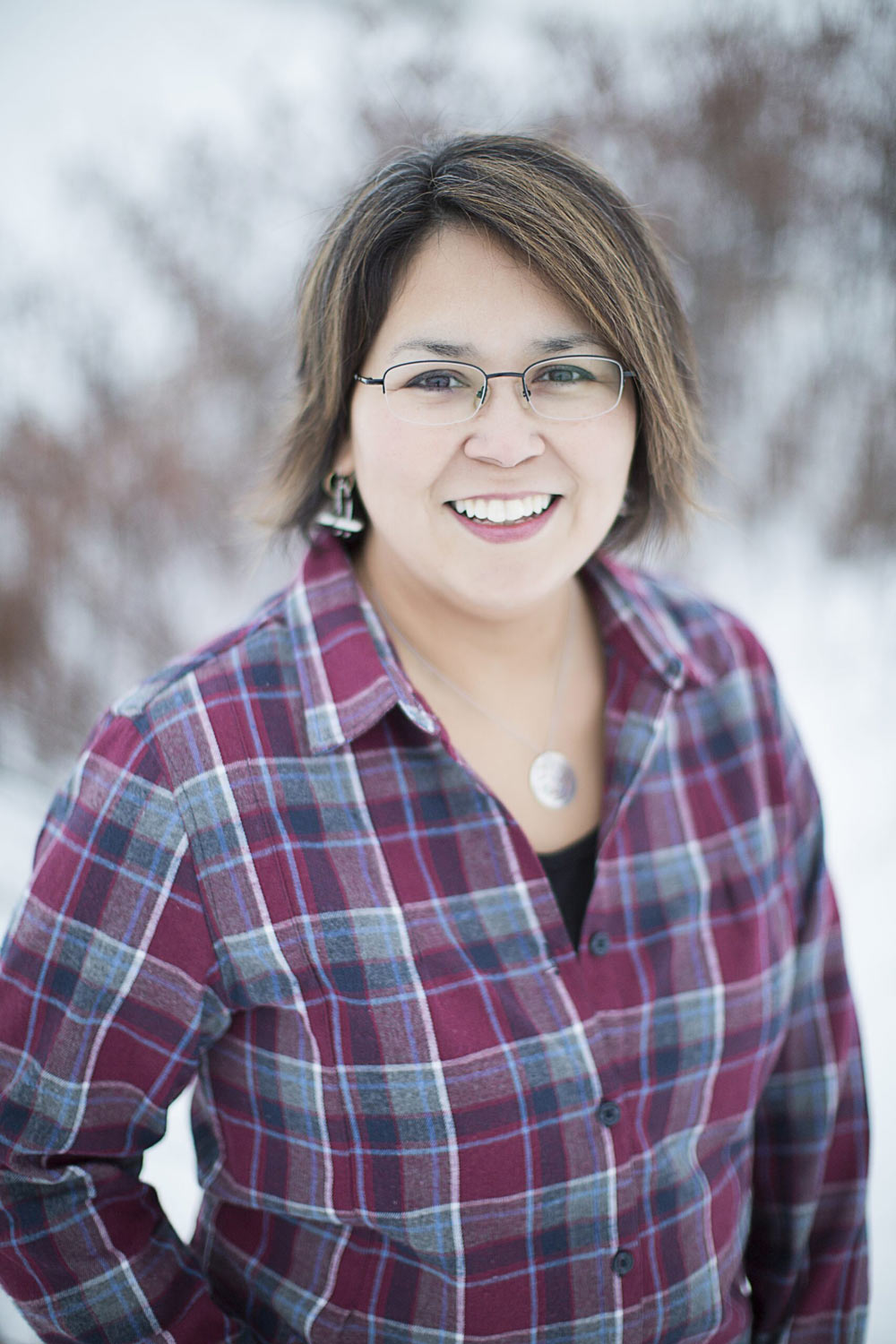

A Fine Balance

he strong, measured, and contemplative voice in Open the Dark, a debut collection of forty-two lyric poems, belongs to poet Marie Tozier (Inupiaq/Puerto Rican.) The book’s release in August 2020, at the height of the coronavirus pandemic, prevented Tozier from giving any public readings. The work drew attention, however, and last winter the Poetry Foundation chose her poem “Little Brother” as a Poem of the Day and included two more on its site, and Poetry Daily featured “Aakuaksrak” as a Poem of the Day.” Marie wrote the poems for her Master of Fine Arts (MFA) from the University of Alaska Anchorage, which she received in 2016.
Originally from Nome, Marie celebrates a life that harmonizes with seasonal rhythms and the land’s varied offerings throughout the year. Most of her short lyric poems focus on family, the northwest landscape, nature, seasons, gathering food, fishing and hunting. Other poems, however, highlight the challenges and problems that beset Native people. The writing, subtle and restrained, explores joyful moments, personal traumas, memory and loss. The language is accessible and clear but with layers of complexities and meanings.
Marie is an archivist of family history and of changes in her homeland. She recounts stories heard from Elders, most importantly from her mother and her grandparents, all now gone. She writes about past and present injustices and traumas inflicted by Western education to remind people that many old injustices persist.
When Tozier was eight her mother married John Garrison, also Inupiaq, who adopted Marie and her younger sister. She grew up Inupiaq but never forgot her Puerto Rican birth father’s heritage and culture. “Growing up we knew of our other family in Puerto Rico and in high school we traveled there and met my father’s other family, including brothers and a sister.” The first book is about her family and life in northwest Alaska, but she also wrote poems about her Puerto Rican experience. Three of those poems will appear in a forthcoming issue of the Alaska Quarterly Review.

Marie learned family history, legends, skills from her mother Laraine and maternal grandparents Ethel and Dan Karmun. Her grandfather recounted stories of his youth, hunting adventures, and his family’s history, including the tale of his grandmother who stole away on a whaling ship from Russia to escape her abusive husband. Later, when she began to compose poems, Marie recorded those stories.
Her mother and grandparents recognized the importance of Western education to obtain jobs to pay for things requiring cash and they emphasized the value of education. “Reading was very important to my mother, so I read a lot and I studied hard and got good grades.” After high school she attended Stanford University for a quarter but returned to Alaska after the 1989 earthquake there. “When that earthquake hit, I said, ‘Nope, I don’t like this. I am going back home.’”
She continued her studies but put them on hold when she married and eventually became “a stay-at-home mom of seven children.” When she began to homeschool her children, she started part-time classes through UAF, earning her Bachelor of Arts and Science in 2008. She continued taking classes in creative writing through UAA and enrolled in UAA’s low-residency MFA program in 2012.
Marie wrote mostly nonfiction and memoir earlier but chose poetry for her MFA. “Poetry was the bigger challenge and I felt it was a more difficult form than narrative prose,” she said. Her poems continue the ancient storytelling tradition used to transmit knowledge.
To read Open the Dark is to journey to a place and a way of life inaccessible to most. Tozier invites readers to see her life and the place she calls home. “I want readers to come with an open mind and leave with the experience of seeing a little bit of a different culture. I also hope Indigenous people will take away the idea that they can share their culture and they can stand up for their culture.”
Relatives populate the work–grandparents, her mother and her brother and others. “Man of Virtue,” is about Marie’s grandfather, Daniel Karmun, a Native leader and a minister, who travels with his Bible to villages and ministers to “The fatherless and widows in their / affliction.” She highlights his ingenuity in “Making Do,” a story from his childhood, when Karmun was too young to climb cliffs with older brothers to gather tern eggs. Eager to help, he devised a solution:
fashioned a long stick
with a fabric pocket. Reached down
And swooped eggs from the nest.
Another story from Daniel’s youth, “Grandfather Says,” shows how lessons are also learned from life and not only books. The poem recreates a time when Daniel’s brothers took him “to the ocean’s still, icy / coast to teach me how to hunt seal.” Tasked with making oatmeal every morning, the young boy remembered his mother salting the water for oats, but he decided to improvise and used seawater. When his brothers “one by one tasted / the oatmeal. They spit it out.” Knowing he had learned his lesson, “brothers laughed. / They never scolded, // That wasn’t our way.”
Grandmother Ethel Karmun gave all her grandchildren Inupiaq names and shared her own name, Anausuq, with Marie. The two were close and Marie learned from her “things that she didn’t necessarily teach even her daughters like processing and putting up oogruk and seal oil.” The grandmother who lives on in the poems is both loving and demanding, whose desire is for her granddaughter to learn well.
In “She Even Used a Ruler,” her grandmother leaves “her prized / possessions. / Kuspuks patterns she used to outfit / herself.” Tozier treasures those patterns “cut from a windbreaker, / deep maroon and old” and makes the “pieces my own, / traced . . . onto / brown paper.” During sewing lessons her grandmother watches closely for “minor flaws,” and reminds Tozier to “to be precise. / Use a ruler to be exact, / like her.”
During summers Tozier went with her grandmother to her cache near the ocean and helped put up fish. After her grandmother’s death in 2013, the tradition continued. In “Cache” Tozier and her family return “every summer, / spawning salmon, / finding that faint / scent of home.”
The short and poignant poem “Life without Her” laments the absence of Tozier’s mother, who died in 2006. The poem conveys her loss in three lines and nine words to show how life without her is less orderly:
Mismatched china
Trying to pass
For a complete set.
Other poems capture the beauty and bounty that accompanies each seasonal shift. Species—fish, birds, seals—arrive and depart. The tundra loses its cover of white, reverts to denuded browns of fall before turning to the greens of warmer months. People cycle through different activities as they dig roots, pick berries, gather greens, hunt, trap, and fish.
In Aakuaksrak a pair of sandhill cranes arrive with spring for their summer sojourn. The sighting of the cranes leads to an origin story of how the world and its beings came about. In spring, the warming tundra lies clad in dull colors of colder seasons and the cranes’ “dirt-brown” bodies meld into it as they settle to feed and nest. As summer fades into fall and cranberries ripen the wife feeds them to her husband but
. . . He balked. He made fun
Of the tiny morsel. At night, while he slept,
She dressed his eyes in red berry pulp.
Staining him for life.
If there is a lesson in this story it is that all actions have consequences. For the male crane it was acquiring the red crown that becomes the hallmark of his species, both male and female. Making fun of those who love you will lead to trouble, the poem seems to say.
The pleasures of summer and autumn are noted in other poems. Lingonberries picked in fall yield
Bright red kernels
Tart on the tongue—
When fully ripe
Of burnt claret.
Summer and fall inevitably turn to winter. In “Approaching Winter,” the tundra empties migratory birds, and rotting willow and malakchuk or spawned-out fish stink up the near-shore. A lone “white and mottled gray” gull flies “Across an expanse of silt” and preens on “pink legs, long pale- / yellow beak / Raised in the air” like a debutante in a ruffled gown.

In “Indian Health Services” the non-Native nurse assumes, in her ignorance or prejudice, that all Native women are unsafe at home and their partners don’t respect them. Going to a hospital is traumatic enough and made worse when the nurse enters and “Asks me if I am safe / At home. / ‘Yes,’ I reply.” Unconvinced, the nurse asks, “Are you respected?” and exposes how the Indian Health Service fails to respect Native people.
Tozier has experienced such stereotyping. She knows how it feels as the only Native in a room. “Many times, at local school board meetings I was the only Alaska Native speaking up. During the three years in the UAA MFA program I was the only Alaska Native student.” She knows concerns voiced about the educational system that fails Native students, especially male, are disregarded.
The powerful poem, “They Tried to Teach Me History,” also the longest, is midway in the collection. It contrasts Western notions of education with the old ways of learning, which White educators denigrated. Marie uses words spoken by U.S. Indian Agent John S. Ward in 1886 as an epigraph:
“The parents of these Indian children are ignorant,
and know nothing of the value of education.”
Marie pulls apart those words and uses them one by one to begin each stanza. She takes the quote’s first word “the” to speak not of the Bible’s “in the beginning God created the heaven and the earth.” Instead, she records what is essential and important for her people:
THE
Beginning.
First steps,
Declaring
What is.
Naming it.
Oogruk: bearded seal.
The poem moves through many aspects of life in the north that Westerners do not understand. In a few words it captures the sorrow, the systemic racism coupled with the pain of assimilation and loss of life. She alludes to her brother’s suicide in a stanza starting with “are,” stating that “are / Is better than were. / My brother was lost. / And now he is gone.” The poem goes on to point the negativity of outsiders who dismiss Native people as “ignorant,” which is “another word / For: Why / Can’t you do it my way?”
A searing denouement ends the poem. It has nothing to do with classrooms, or teachers but everything with the “process / For cutting seal.” That skill, honed through centuries of living off the land is vital in a place where people still rely on subsistence. At the poem’s end, the seal processed, it is time to turn to “water / To wash away / The sin / Of being.”
Tozier’s poems will resonate with readers. They will find their own meanings in them.